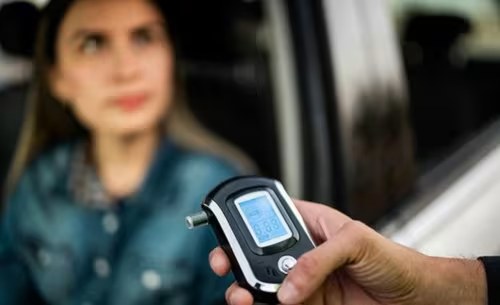Disclaimer: This guest post was written by a third party and is for informational purposes only. It does not constitute legal advice or create an attorney-client relationship with The Meehan Law Firm. For legal advice, please contact our office.
%20(1).webp)
%20(1).webp)
In California, DUI (driving under the influence) is a serious offense that can lead to undesirable penalties, and breathalyzer tests are often used to determining blood alcohol content (BAC). There is one factor that can significantly influence the accuracy of these tests called "mouth alcohol." This article explores the concept of mouth alcohol, its effects on DUI breath tests, and how it can be used as a defense strategy in California courts.
What is Mouth Alcohol?
Mouth alcohol in DUI cases refers to the leftover alcohol in the mouth that can affect breathalyzer readings. Unlike alcohol in the bloodstream, which reflects systemic intoxication, mouth alcohol can be temporary, usually detected from recent consumption of alcoholic beverages or certain substances.
Causes and Persistence of Mouth Alcohol
There are several reasons as to why one might have mouth alcohol. For instance, consuming alcohol right before taking a breath test can leave traces of alcohol in the mouth. Also, certain medications and mouthwashes containing alcohol can introduce mouth alcohol. It is also possible for mouth alcohol to linger if an individual burps or vomits shortly before the test.
The persistence of mouth alcohol varies, but it typically remains detectable for a brief period after consumption. This can lead to inaccurate breathalyzer readings if not properly managed.
Impact on Breathalyzer Accuracy
When an individual has mouth alcohol, it can result in inaccurate high breathalyzer readings. Breathalyzers are designed to measure the alcohol content in deep lung air, but if mouth alcohol is present, it can skew the results. The device may pick up higher alcohol levels from the mouth rather than reflecting the actual BAC, leading to potential overestimation of a person's blood alcohol content.
Procedures to Prevent Mouth Alcohol Interference
In order to avoid inaccurate mouth alcohol readings, California law mandates specific procedures be followed during evidentiary breath tests. Officers are required to observe the individual for 15 minutes before using a breath test to ensure that no alcohol is consumed, burped, or regurgitated during this period. This observation period aims to reduce the chances of mouth alcohol affecting the test results.
Legal Defense: The Mouth Alcohol Argument
Mouth Alcohol in DUI cases: let’s imagine a scenario where an individual was pulled over on suspicion of DUI and given a breathalyzer test. They may not have consumed enough alcohol to exceed the legal BAC limit of 0.08%, but the test shows they’re over the limit. How could this have happened? Mouth alcohol could be to blame.
In Mouth Alcohol in DUI cases, mouth alcohol argument can be used as a defense strategy. An experienced defense attorney may argue against the California DUI prosecution that the breathalyzer reading was artificially high due to residual mouth alcohol rather than reflecting true blood alcohol content. To successfully use this defense, the attorney must provide evidence showing that mouth alcohol was present and likely influenced the test results.
Evidence that can support this defense includes testimonies regarding recent alcohol consumption or use of alcohol-containing products before the test. In Mouth Alcohol in DUI cases, Medical records or expert opinions can be of great help proving that mouth alcohol was the factor affecting the test result.
Sometimes dental issues or medical devices in the mouth may also trap alcohol, and cause an elevated reading.
The Role of Breathalyzer Procedures in DUI Cases
In California, the law requires that breath tests be used according to specific guidelines to make sure they are accurate. If a police officer fails to follow these procedures, including the mandatory observation period, This can be a reason to undermine the validity of the test results.
Mouth Alcohol Slope Detector
The new Breath Machines have what is called a slope detector which is designed to detect mouth alcohol, by determining that the alcohol emitting from the person being tested, starts high, and then goes down the longer the person blows into the machine, which is the opposite of what you would expect. Or there is a spike of alcohol, then a sharp drop off. These slop detectors are supposed to not display a result, but to return a result of “mouth alcohol.” If this is the result, the officer should start the 15 minute observation period again.
Finally, to perform the breath testing correctly, the officer must test the driver twice (at least two minutes apart) and the test results must not vary more than acceptable to be valid.
Stay informed about legal updates
Read the latest information about DUI charges and their consequences on our blog. Stay informed about legal updates, penalties, and defense strategies. For reference, use our Blood Alcohol Calculator (BAC) to check your potential level of impairment.
(844) 4-DUI STOP
Categories
Need Help?
Free Consultation, discreet, and no obligation- talk to an attorney.
More Blogs

How Can You Defend Someone Who Is Guilty?
Defense attorneys protect constitutional rights, ensure due process...
Read More..
Why a Second DUI Might Be Your Wake-Up Call
Facing a Second DUI in California: Why It Should Be Your Wake-Up Call..
Read More..
How To Spot a Bad DUI Lawyer in 10 Minutes or Less
Choosing the Right DUI Lawyer in California: Spotting Red Flags Early...
Read More..



